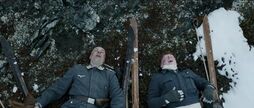One war, one wooden house; two camps, five youths. That's what this anti-war movie is all about. In 1940, Hitler's Nazi Germany was ravaging Europe like crazy, and Britain and Germany were fighting each other on the battlefield. On an ice sheet in Norway, three German soldiers and two British soldiers had to live together in the white desert because their respective planes were shot down. From the moment they were under the same roof, suspicion and hatred were always shrouded in this log cabin. First, the Germans "captured" the British and drew a "national border"; then the British planned how to counterattack; the Germans were always on guard against the British's various schemes... Unexpectedly, although they were incompatible enemies, none of them killed each other. Maybe the other side wanted to use each other to survive in harsh conditions; maybe it was because they never thought about it. Regarding this war, British soldier Smith asked inexplicably, why did you Germans start this war? Isn't it enough to claim most of the land in Europe? And the German Soppis replied unhurriedly: "Because of the military order." In his view, whether it is the German army or the British army, they are just doing the same thing. Both countries came to the other's territory for land and raw materials. The British, "holding a robbery in one hand and a Bible in the other, sailed to other countries to ask for anything" and used the blood and tears of the people of other countries to create the so-called "empire on which the sun never sets", but it was only fifty steps. Just laugh a hundred steps, in essence, there is no difference between the two. After hearing this, Smith fell into deep thought. In the atmosphere of getting along day and night in the quarrel again and again, the relationship between the five of them has also undergone a subtle change. Faced with severe living conditions, everyone knows that only by letting go of each other's prejudices can they have a chance in this cold and frozen northern land. So they threw their weapons and hatred outside the house, tore down planks to make a fire together, went out to hunt together, captured elk, and even sang together under the aurora of the North Pole. One night, everyone discovered the wine that the owner had kept for many years under the floor of the log cabin. So a few people lit a bonfire in the house, played games, and had a good time. After three rounds of drinking, each of them told the truth about their life and their dreams, and each of them had a helpless reason for having to step into this bottomless abyss. Had it not been for this absurd war, everyone's fate would have changed dramatically. But there is no doubt that no one would want to be an instrument of this war. So Soppis, a Nazi German soldier, threw Hitler's autobiography "Mein Kampf", which was regarded as a treasure by German soldiers, into the fire. As the book was burnt to ashes, he also broke free from the shackles of being imprisoned. That night, everyone was very happy except Joseph, who had to be amputated due to his injuries. They shouted, laughed, and sang; like a group of best friends who had known each other for years. When the outside world is a mess, only this small wooden house standing in the blizzard is still full of laughter and laughter, as if it is generally unaffected like a paradise. Four young men forgot their identities and their "missions" and lived happily in this troubled world - but only for this night, because they I don't know, because the crashed Nazi German fighter plane was found, the Norwegian military has sent people to search. Everyone will usher in the final judgment of this war for themselves in the near future. The next day, it was snowing and sunny. Several people did not expect that the Norwegian military was quietly ambushing nearby at this time. In the face of Sopis and others in Nazi German uniforms, the ending is self-evident. The two British soldiers were also suspected of treason. When the two Englishmen were "interrogated" by Norwegian officers, Soppis came and returned to him the lighter that had been taken from British Captain Devonpoor. Looking at the lighter on the table, Dai Wenpo smiled in relief. At the end of the movie, looking at Sopis, who is about to be sent to prison, Devin Poe seems to be saying goodbye to his confidant. Without too much sadness, a meaningful smile can contain all the stories. The movie ends here, but the story of Devonpoe and Soppis continues. In real life, Devon Poe's prototype called the erstwhile "enemy" years after the war and invited him to visit London - as a friend. Although the two of them were the only people in the cabin now, no one or anything could interrupt their reunion this time. Whatever the name, war is always cruel. It kills the dead and tortures the living. In World War II, like several protagonists in the movie, there were thousands of young people with their own lives and dreams, but they had to wrap their bodies in horses in the end, or fought with people they had never known before in the trenches. However, in times of peace, they may not know each other's existence in this life, or they may be able to gather under the same roof to chat and laugh. For us in real life, all of us live in a small wooden house with our own beliefs and prejudices, and endure the disputes brought by the world. But if we turn against each other and let out the anger and prejudice in our hearts, it will be difficult to reconcile with others in the end. On the lighter, Dai Wenpo smiled relievedly. At the end of the movie, looking at Sopis, who is about to be sent to prison, Devin Poe seems to be saying goodbye to his confidant. Without too much sadness, a meaningful smile can contain all the stories. The movie ends here, but the story of Devonpoe and Soppis continues. In real life, Devon Poe's prototype called the erstwhile "enemy" years after the war and invited him to visit London - as a friend. Although the two of them were the only people in the cabin now, no one or anything could interrupt their reunion this time. Whatever the name, war is always cruel. It kills the dead and tortures the living. In World War II, like several protagonists in the movie, there were thousands of young people with their own lives and dreams, but they had to wrap their bodies in horses in the end, or fought with people they had never known before in the trenches. However, in times of peace, they may not know each other's existence in this life, or they may be able to gather under the same roof to chat and laugh. For us in real life, all of us live in a small wooden house with our own beliefs and prejudices, and endure the disputes brought by the world. But if we turn against each other and let out the anger and prejudice in our hearts, it will be difficult to reconcile with others in the end. On the lighter, Dai Wenpo smiled relievedly. At the end of the movie, looking at Sopis, who is about to be sent to prison, Devin Poe seems to be saying goodbye to his confidant. Without too much sadness, a meaningful smile can contain all the stories. The movie ends here, but the story of Devonpoe and Soppis continues. In real life, Devon Poe's prototype called the erstwhile "enemy" years after the war and invited him to visit London - as a friend. Although the two of them were the only people in the cabin now, no one or anything could interrupt their reunion this time. Whatever the name, war is always cruel. It kills the dead and tortures the living. In World War II, like several protagonists in the movie, there were thousands of young people with their own lives and dreams, but they had to wrap their bodies in horses in the end, or fought with people they had never known before in the trenches. However, in times of peace, they may not know each other's existence in this life, or they may be able to gather under the same roof to chat and laugh. For us in real life, all of us live in a small wooden house with our own beliefs and prejudices, and endure the disputes brought by the world. But if we turn against each other and let out the anger and prejudice in our hearts, it will be difficult to reconcile with others in the end. stricken by the strife of the world. But if we turn against each other and let out the anger and prejudice in our hearts, it will be difficult to reconcile with others in the end. stricken by the strife of the world. But if we turn against each other and let out the anger and prejudice in our hearts, it will be difficult to reconcile with others in the end.
View more about Into the White reviews











